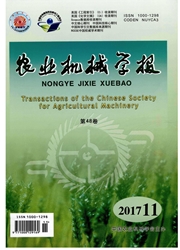

 中文摘要:
中文摘要:
采用不同浓度氟硅烷-乙醇修饰液对高、宽分别为2.0 mm、1.0 mm的矩形截面微通道进行修饰,得到了表面能不同的微通道试件,并以R141b制冷剂为实验工质,设定实验工况,在微通道试件中进行沸腾换热实验,探讨具有不同表面能的微通道对两相流动沸腾传热压降特性的影响。实验结果表明:修饰液浓度越高,浸泡时间越长,修饰后槽道的表面能越低;表面能的改变不会对各压降所占比例造成大的影响,但会影响两相摩擦压降,减小表面能会增大单位长度两相摩擦压降,实验中的增大率达到5.1%和12.7%;将实验数据分别与相关模型的预测值进行了对比,并对模型关联式进行了修正,所得到修正模型的平均绝对误差明显降低。
 英文摘要:
英文摘要:
With the wide application of microchannel heat exchanger,more and more researches focus on the microchannels and the pressure drop characteristics are important research object. Pure refrigerant R141 b was used as working fluid in microchannels to carry out boiling flow experiments and explore the effect of surface energy on flow boiling pressure drop characteristics. Fluoroalkylsilane solution in different concentrations was used to modify the surface energy of different microchannel tests with size of2. 0 mm × 1. 0 mm,and tests were obtained with different surfaces energy. The flow boiling pressure drop characteristics were experimentally investigated through the tests by using R141 b refrigerant. The influence of surface energy on pressure drop were investigated,and then a modified model was got. The results showed that the surface energy of tests were low with long immersion time and high concentration,and the tests with low surface energy had big numerical value of frictional pressure drop. The two-phase frictional pressure drop was increased by 5. 1% and 12. 7%,respectively. The predicted values of different correlated models were compared with experiment values,and a modified model which had a better predicted result was obtained,the mean absolute error was decreased obviously. The result provided supplement for the research on flow boiling resistance characteristics.
 同期刊论文项目
同期刊论文项目
 同项目期刊论文
同项目期刊论文
 期刊信息
期刊信息
